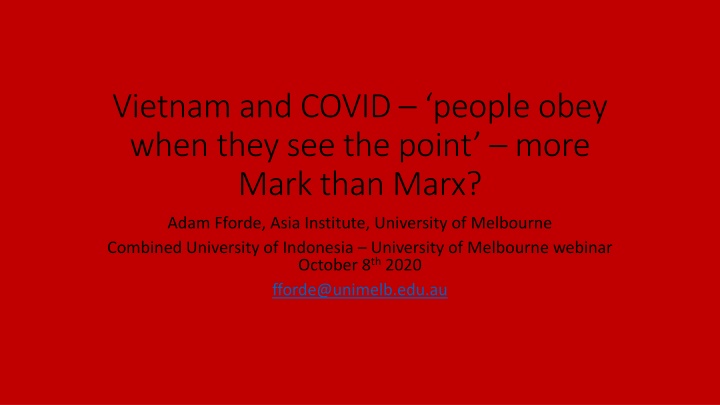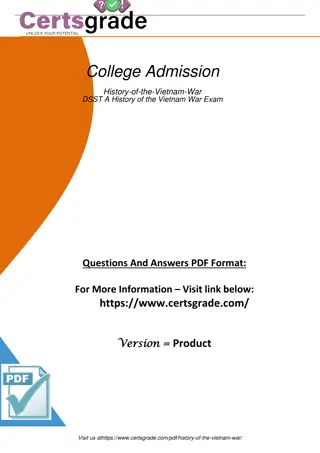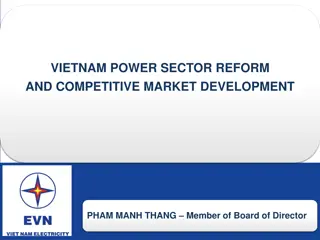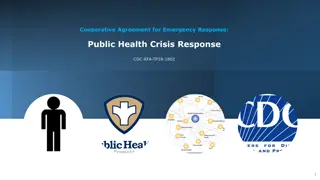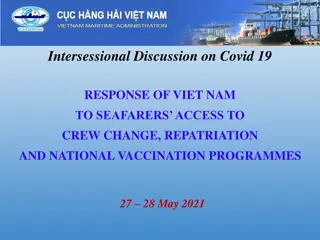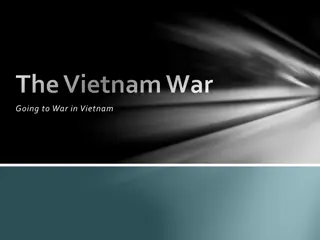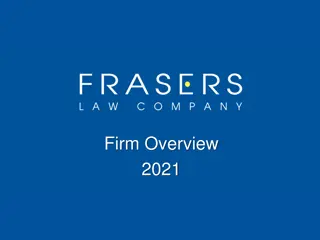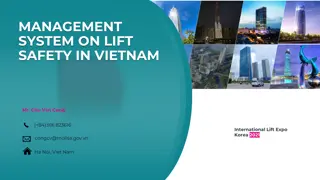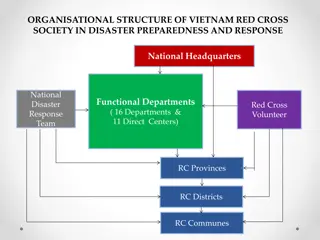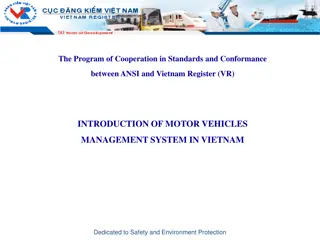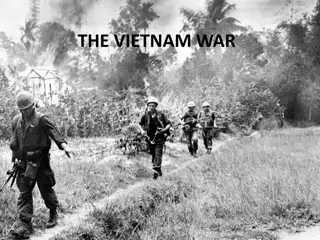Vietnam's Successful COVID Response: A Study on Public Policy and Social Compliance
Vietnam's effective response to the COVID-19 pandemic has been attributed to good public policy, high levels of social compliance, and a robust public health system. Reports suggest low infection rates, minimal deaths, extensive testing, contact tracing, and quarantine measures. The government's proactive approach, combined with public trust and cooperation, has played a vital role in mitigating the impact of the virus.
Download Presentation

Please find below an Image/Link to download the presentation.
The content on the website is provided AS IS for your information and personal use only. It may not be sold, licensed, or shared on other websites without obtaining consent from the author.If you encounter any issues during the download, it is possible that the publisher has removed the file from their server.
You are allowed to download the files provided on this website for personal or commercial use, subject to the condition that they are used lawfully. All files are the property of their respective owners.
The content on the website is provided AS IS for your information and personal use only. It may not be sold, licensed, or shared on other websites without obtaining consent from the author.
E N D
Presentation Transcript
Vietnam and COVID people obey when they see the point more Mark than Marx? Adam Fforde, Asia Institute, University of Melbourne Combined University of Indonesia University of Melbourne webinar October 8th2020 fforde@unimelb.edu.au
Knowledge? What is the basis for good public policy in a pandemic? COVID is a virus that poses the experts with considerable technical problems, ranging from understanding or predicting its spread to how to help people who are ill with it. Naturally, there is a need and a drive to create meaning , and it is clear already from the relevant literature that Vietnam s apparent success is widely attributed to state actions good policy . People are not robots. Authority is a relationship. But policy logic often ignores this. What is the sense of - the GoV provided a whole-of-society approach [11]? No government really has the power to do this; it is not alone. Vietnam and COVID - Adam Fforde Oct 2020 - Asia Institute 2
Vietnam and the instant picture Information? A range of reports tell us that the Vietnamese have done very well in coping with COVID. There have been almost no deaths, and very low reported infections. Are these credible? There is a lot of information, which is suggestive. Vietnamese are generally sceptical about their officials statements. But they have FB and attitude , and the state provides lots of information on policy, COVID events and so on. This pushes for credibility. The website https://www.worldometers.info/coronavirus/country/viet-nam/ gives (as of 2nd Oct) total cases 1,074; daily new cases on a 7 day moving average peaking first at 12 on April 2nd, then at 35 on Aug 7th and some signs of a third spike in Sept with 17 cases on Sept 29th. Total deaths reached 35 on Sept 3rd and there have been none since (as of Sept 30th). The first deaths were on July 31st. Vietnam and COVID - Adam Fforde Oct 2020 - Asia Institute 3
Data on the pandemic Official responses to COVID are widely praised - good results due to good policies (https://ourworldindata.org/covid-exemplar-vietnam accessed 2nd Oct. Background - Public health spending reported as rising 9% per cap annually between 2000 and 2016. No mention of the bribes needed to access to care promised by insurance schemes. Testing done well and extensively, drawing on a powerful system founded on event- based surveillance allowing a wide range of people to input data on public health events to the central database. Locally-made test kits were widely available, with high levels of tests per confirmed case (a number driven by the low rates of infection). Contact tracing is relatively very high and thorough, based on risk of infection rather than exhibition of symptoms (which would seem to by-pass the problem of asymptomatic infections ). Isolations. Over 200,000 people were put in quarantine facilities. Reactions to this on social media are reported as positive. Lockdowns were used, including a nationwide lockdown from April 1st Vietnam and COVID - Adam Fforde Oct 2020 - Asia Institute 4
Popular views? Looks good. The Vietnamese have not seen ICU congestion and the brutal issues of triage. What about politics and the popular response to COVID? Dalia research in 45 countries in March 2020 found that the Vietnamese surveyed reported the lowest % globally asserting that their government had done too little in response to the pandemic 13%, and the highestasserting the right amount 62%. [https://daliaresearch.com/blog/dalia-assesses-how-the-world-ranks- their-governments-response-to-covid-19/ accessed 26th Sept 2020] Looks good too. Vietnam and COVID - Adam Fforde Oct 2020 - Asia Institute 5
But Generally, the Vietnamese have little reason uncritically to trust the ruling VCP. There is a long history of popular unruliness and growing willingness to demonstrate and mobilise in other ways against disliked policies. Generally, the state looks bad . The Party has lost considerable authority, for example: its failure to deal with the widespread corruption, suspicions that elements within it may be soft on China , a common general sense that it is distant from the people, with increasing violence against opponents. And the state and Party structures do not normally show internal discipline, so policies on paper are not guaranteed to be implemented. So, would the people treat official pronouncements seriously and would officials step up ? Would compliance be forced, or would there be self-policing and popular evaluation of policy and officials? Vietnam and COVID - Adam Fforde Oct 2020 - Asia Institute 6
The formal policy response Like anybody else with internet access and Vietnamese language capacity I can examine in detail the formal policy response, its sequencing and deployment of local (provincial/city) responses that are varied. That we can is significant. Data sources: many, I use the website https://thuvienphapluat.vn/ - free, contains laws and directives of the PM, Ministries and local governments (provinces/centrally-governed cities 63, total population near 100 mn) Searches on COVID etc give perhaps 1,000 documents around now . These show anybody who cares to look interesting things about the formal policy history and its rhetoric. The initial sequence was: 16th, 17th 21st January policy from the Ministry of Health. Vietnam and COVID - Adam Fforde Oct 2020 - Asia Institute 7
The state talks to itself and to the people Then, 23rdJan, from the Premier, a C ng i n ( Special Telegram ) Then local government - 24th Jan Hai duong and Ninh Thuan provinces are the first to issue plans, not to a single template. Central vision, local implementation. Not blueprint driven this stance driven home by the big alarm - 28th Jan PM Directive on anti-COVID measures Ministries, branches and localities must not be subjective ( ch quan ) and must see their work as fighting an enemy ( ch nggi c ). That is, a don t mess up and respond to real local needs rhetoric from the PM (not the Party). Tough and deadly serious. War rhetoric familiar from before 1954, before 1975 and 1978/79. Then, 31st March Appeal from VCP General-Secretary. Again, the language is war in a time of peace ( cu c chi n u trong th i b nh ). But the main content is to thank officials, not the people - Ch ng t i not Ch ng ta Different not sure why. Vietnam and COVID - Adam Fforde Oct 2020 - Asia Institute 8
Popular responses and interpretations of policy Many of these documents require that officials listen to and report on public opinion. There is a large security apparat. But one way of accessing opinion is to look at Mark FB. Vietnamese colleagues say FB was part of a public discussion that was very important as people made up their minds . It underpins the poll data from Dalia. Policy was deemed good and so authorised. I have been told by one Vietnamese - war is one thing, and then the population looks for strong leadership; when it is a matter of making a living, they want a more democratic politics . And by another, yes, but what will happen at the 2021 XIIIthParty Congress? . Examination of the FB pages of various well-known people shows a vivid and open discussion (not new). Good stuff, fascinating - You could write a dozen PhDs using this data . And there are other sources. People are not robots. This is a very short summary of evidence for what happened. Conclusions? Vietnam and COVID - Adam Fforde Oct 2020 - Asia Institute 9
Explaining Vietnams success (so far) I think Vietnam s success (so far) reflects A. Politically and practically effective official responses, led from the top, with adaptive coherence of government actions at all levels, withB. Popular criticism and acceptance, and so authentic authorization of those responses. That is, both. This is the most important lesson. As such, it combined consensual popular compliance (and so more and better self-policing) with sound policies with both societal andleadership pressure upon officials to step up . Perhaps 4 implications for thinking about Vietnamese politics and governance moving forward: The Vietnamese state can be part of focused and effective national action. Officials, as Vasavakul has recently written, can be and often want to do a good job . COVID shows they can. They stepped up at a time of national emergency. Why? Authority, conferred upon officials and state actions by the population, based upon informed critical reflection and choice, is key. These core lessons, of the origins of a national endeavor ( both ), are not fully appreciated by the current top Party leadership, which stresses instead the leadership role of the Party and state. There is an emerging political opportunity, a semi-structured void . How and if the Vietnamese exploiting this will require clever politics, intellectual creativity and luck. Vietnam and COVID - Adam Fforde Oct 2020 - Asia Institute 10
